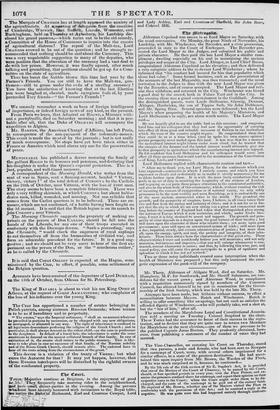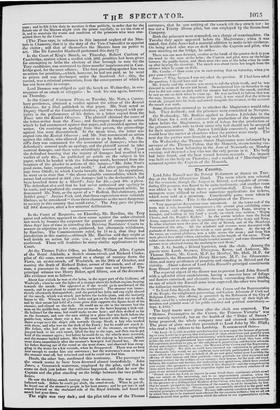The Vice-Chancellor, on entering his Court on Thursday, stated that
two persons, a male and female, who had been sent to Newgate for a contempt of Court, were, with several others imprisoned for a similar offence, in a state of the greatest destitution. He had ascer- tained this upon inquiry from Mr. Brown, the Warden of the Fleet, and he was much surprised at it, because, he continued— By the 7th rule of the 15th section of Sir E. Sugden's Act, it is provided that one of the Masters of the Court of Chancery, to be named by the Court, should, at four specified periods in every year, visit the Fleet Prison, and ex- amine the prisoners confined there for contempt, and report their opinion on their respective cases to the Court ; when the Court might order them to be dis- charged, and the costs of the contempt to be paid out of the suitors fund. He inquired of Mr. Brown, whether any of the 'Masters visited the Fleet in conformity with the provisions of this Act ; and he received a reply in the negative. He was quite sure this had happened entirely through =advert-
epee; and be felt it his duty to mention it thus publicly, in order that for the future one of the Masters might visit the prison regularly, to see the state of it, and to ascertain the wants and condition of the prisoners who were com- mitted there by the Court.
[The Times says, in reference to this imputed neglect of the Mas- ters in Chancery, that it is the duty of the Vice. Chancellor to appoint the visiter ; and that of themselves the Masters have no power to act. Has Sir Lancelot Shadwell performed this duty
In the Court of King's Bench, on Thursday, Robert Canham of Cambridge, against whom a verdict with 500/. penalties bad been given for attempting to bribe the electors of that borough to vote for the
Tory candidates, was sentenced to three months' imprisonment in Cam- bridge gaol, for the same offence. The first proceeding against him was
an action for penalties,—which, however, he had not paid, as he went to prison and was discharged under the Insolvent Act : this, the second, was a criminal prosecution, from the consequences of which he has not been able to escape.
Lord Denman was obliged to quit the bench on Wednesday, in con- sequence of an attack of erisypelas : he took his seat again, however, on Thursday.
In the Court of Common Pleas, on Tuesday, Mr. Nutt, a Canter- bury gentleman, obtained a verdict against the editor of the Kentish Observer, for a libel published, in that paper. Mr. Nutt acted as Deputy Sheriff at the Canterbury election ; and was charged with par-
tiality in the performance of his duties, in a letter copied from the Times into the Kentish Observer. The plaintiff obtained the name of the letter-writer from the Times ; and thereupon dropped an action which he had commenced against that paper, and proceeded against the writer. On receiving an apology from that person, the proceedings against him were discontinued. In the mean time, the letter was copied into the Kentish Observer ; and Mr. Nutt commenced an action
against the editor, who allowed judgment to go by default. A She- riff's Jury was summoned for the assessment of damages; when the
defendant's counsel made an apology, and the plaintiff agreed to take nominal damages, and these were accordingly assessed at 40s. Upon the defendant learning that the inquiry of damages had resulted in a
verdict of only 40s., he published an article on the subject in his paper, which he headed with the following words, borrowed from the language of the pleader in actions of this nature—" Mr. John Nutt's good name, fame, reputation, and credit." And after quoting the pas- sage from Othello, in which Cassio bewails the loss of his reputation, he went on to state that " the above valuable commodities, which the owner had estimated at 500/. (the damages laid in the declaration), had been knocked down by a Sheriff's Jury for 40s.—just 10s. a piece. The defendant also said that he had never authorized any apology to be made, and repudiated the compromise. In a subsequent article, he denounced Mr. Nutt, as the agent of a" Radical, Revolutionary, and Infidel gang." Justice Park said, that those expressions were certainly libelous, as he considered" these three characters as the most dangerous to society in this country that could exist." The Jury gave the plain- tiff 100/. damages, after a few minutes' deliberation.



























 Previous page
Previous page